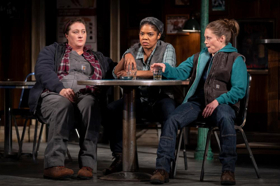Review: SWEAT at Goodman Theatre

Lynn Nottage's 2017 Pulitzer Prize-winning SWEAT, now in its Chicago premiere at Goodman Theatre under the direction of Ron OJ Parson, focuses on a group of blue-collar factory workers in Reading, Pennsylvania. Bound together by the toils of working-class life in the town's steel-tubing factory, these friends and family members gather at a local bar to let off steam and celebrate special occasions. And though the work at the factory may not be fulfilling, Nottage makes clear this work is vital for the characters' livelihoods. For many of them, a life of working at the factory dates back generations. As the play toggles between 2000 and 2008, Nottage also reflects how her characters' lives intersect with current events and questions of race, class, and success in America.
The play opens in 2008 with two young men in a stark parole office: Jason (Mike Cherry) is white and bald, with a face covered in unsettling tattoos of Swastikas and other white supremacist symbols. He gives the parole officer, Evan (Ronald L. Conners) sharp, monosyllabic answers and seems overwhelmed by the task of piecing his life together after serving time in prison. Chris (Edgar Miguel Sanchez), who is black, has a more genial conversation with Evan and appears more energized about the possibilities in front of him. When the subject of Jason comes up, however, it soon becomes clear that the two men are inextricably connected when it comes to the crime committed. As SWEAT progresses, Nottage makes the mystery of this crime the driving force of the play's narrative tension. Because the play mostly unspools as a series of vignettes at the local bar, however, this tension tends to loosen as the run-time continues. That is, until it comes barreling to a climax that I won't reveal here.
While SWEAT sets up its initial intrigue with the mystery of Jason and Chris's arrest, at its heart the play also closely focuses on the friendship of three female factory workers. Tracey (Kirsten Fitzgerald), Cynthia (Tyla Abercrumbie), and Jessie (Chaon Cross) have all dedicated their lives to work at the factory. While it's clear that none of them find the work fulfilling, Nottage quickly conveys that this work is vital to these characters' identities. The three women initially gather to celebrate Tracey's birthday, but competition quickly brews when Cynthia mentions a possible promotion to management. The race between Cynthia and Tracey over who will win the promotion quickly becomes a point of contention in the play. Jessie is too intoxicated in that moment to care (Cross gives a magnificently convincing portrayal of the character's drunkenness, which underscores the dehumanizing nature of her daily work at the factory).
While Tracey and Cynthia see this promotion as representing a new hope, Nottage conveys that life at the factory is bleak and monotonous. The bartender, Stan (Keith Kupferer, in a role that seems tailor-made for him), serves as a peacekeeper and is always willing to lend an ear to his customers. He was also laid off after 25 years at the factory due to an injury. Meanwhile, bar employee Oscar (Steve Casillas) just wants any job on the factory floor, no matter how little it may pay. Cynthia's estranged, drug-addicted husband Brucie (André Teamer) demonstrates the toll that a life working on the factory floor can take.
We never see the factory in SWEAT. Rather, the majority of the scenes take place at Stan's bar. Kevin Depinet's fabulous set design gives the bar a lived-in feel and the details reflect both the play's temporal and physical setting, down to the Philadelphia Eagles and Flyers banners that decorate the space. While these vignettes give SWEAT an effective slice-of-life feel, the overall narrative arc sometimes becomes lost in the individual scenes. Particularly in the second act, some of the scenes appear to start and end without reason. Nottage almost always provides a moment of escalation at the end of each scene, though these big moments don't always feel warranted in a play that is clearly trying to capture the quotidian lives of its characters.
Because SWEAT is a play of moments, however, there's no arguing that some of them are standout. While the entire ensemble does excellent work, Fitzgerald and Cross's work in particularly bears mentioning. As Jessie, Cross initially seems to be a source of comic relief, until we realize her character's excessive drinking is really a way to mask the pain of dreams unfulfilled. Cross delivers a heartbreaking monologue about her desire to travel the world with her boyfriend as a young woman. And though Jessie is by no means old now in her 40s, we are left with the painful reminder that she will never be able to escape the tedium of working-class factory life.
Fitzgerald is a splendid storyteller, finding layers-upon-layers in each line of dialogue. This is especially true when she delivers a stirring monologue towards the end of the first act about a society that no longer values craftsmanship. She gives a master-class performance, as she demonstrates the many ways in which Tracey's plight serves as the embodiment of the plight of many of Reading's factory workers.
Nottage uses characters like Tracey to explore the compelling question of what one can do one's livelihood, one's very identity, is threatened. She does not offer any tidy answers to this question, but it is the moments in which she hits on this theme with needle-like precision that SWEAT succeeds and intrigues the most. And through all of the characters, SWEAT demonstrates that the responses to this threat are varied and not necessarily always productive. But Nottage shows that at the end of the day, all these characters want to do is survive and find a way to pay their bills.
SWEAT plays at Goodman Theatre's Albert Theatre, 170 North Dearborn, through April 21. Tickets are $20-$80. GoodmanTheatre.org/Sweat
Photo Credit: Liz Lauren
Videos
